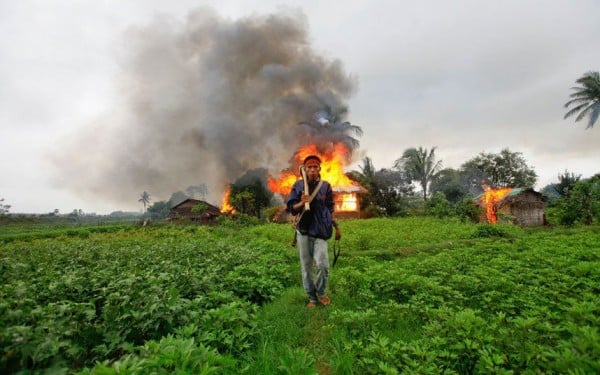
Never again.
Remember that? The world was very determined to never allow another attempt at genocide after the Holocaust. We know now that those words were as empty and hollow as a whiskey barrel on the George Bush ranch. Genocides have happened again and will continue to happen if it is not in the “international community’s” strategic interests to stop it. And when there is a selfish reason to become involved, there is much bragging and chest thumping about how moral and caring our government is.
So I am predicting that we will indeed watch the United States begin arming the Islamic jihadists in Syria. It will, of course, be announced as a noble effort to prevent a humanitarian calamity but which in reality is nothing more than the esoteric policy choice favored by the indefatigable anti-Iran crowd in Washington.
Now juxtapose that with the situation of the Rohingya. Bangladesh doesn’t want them. Burma persecutes them. Thailand traffics them into slavery. And if these three corrupt regimes had their way, the Rohingya would sooner be completely liquidated rather than having to be dealt with as a pesky nuisance and raison d’etre of refugee rights groups.
There are those who consider this genocide. That is a very powerful word and should not be used lightly. However, there is compelling evidence to suggest the term is not misused to describe the deplorable acts against the Rohingya.
The man who coined the phrase, Raphael Lemkin, said the following:
Generally speaking, genocide does not necessarily mean the immediate destruction of a nation, except when accomplished by mass killings of all members of a nation. It is intended rather to signify a coordinated plan of different actions aiming at the destruction of essential foundations of the life of national groups, with the aim of annihilating the groups themselves. The objectives of such a plan would be the disintegration of the political and social institutions, of culture, language, national feelings, religion, and the economic existence of national groups, and the destruction of the personal security, liberty, health, dignity, and even the lives of the individuals belonging to such groups.
This is particularly damning to Professor Aye Chan of Kanda University of Japan who recently reminded us that the effort to dehumanize or, at the very least, revise history is alive and well in Eastern academia.
In his lecture in Myanmar, Professor Chan claimed that “there never were Rohingya people” in Burma. I’ve heard quite the same argument from far-right Zionists who deny the existence of the Palestinians.
This line of thinking is nefarious not just because it is usually accompanied by the advocation of crude use of force by the state, but also because of the clever manipulation and exploitation of symbols, language, relationships and ideology. This has had the ultimate aim of subverting traditional expressions in ways that benefit the state, and their effects are eloquently detailed in stories I’ve read mostly on social networking media. Thus, the argument of these people never existing in the first place is allowed to be propagated.
Of course the Rohingya came from present day Bangladesh, but that is not the point. They’re there now, and the government is maltreating them. The question is what can or should we do to prevent more killing?
There are reports that a new state-sponsored massacre is planned for some time between now and the middle of April. If no one steps up to stop it, we may not be debating whether to call it a genocide in the slaughter’s aftermath.
Photo: Rohingya Arakanese Refugee Committee (RARC)